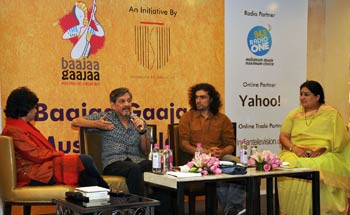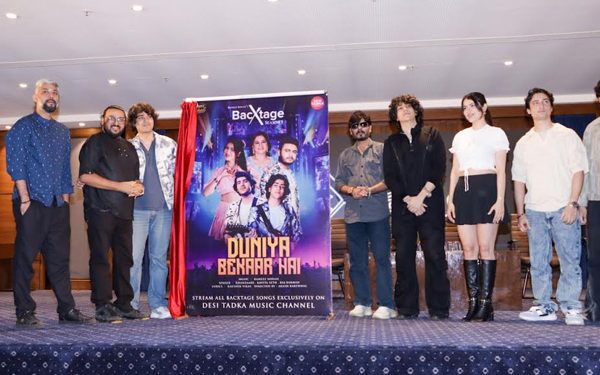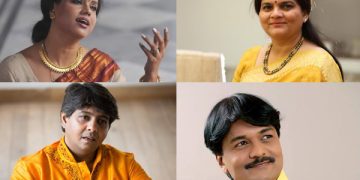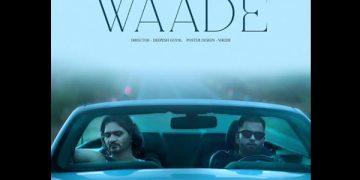PUNE: Shubha Mudgal, an epitome of music brilliance left no stone unturned to make the fourth edition of her annual music festival ‘Baajaa Gaajaa’ to shine in all its glory.
Inaugurated by legendary Javed Akhtar, the three-day fest showcased the richness of Indian music through a blend of interesting discussions and 40 live performances by over hundred artistes who presented classical, folk to western/contemporary forms of music from across the globe. Promoted by Mudgal’s independent record label Underscore Records Pvt Ltd, the festival is spearheaded by the singer and tabla maestro Aneesh Pradhan.
For the first time ever, the fest hosted ‘Music Conclave’ where music industry experts debated and discussed on various challenges and opportunities faced by the Indian Music Industry. ‘Baajaa Gaajaa Music Conclave’ was held on 11- 12 Feb 2012 at Vivanta by Taj – Blue Diamond in Pune.
Hindi music today is hummable but music of the past has gone and item numbers have become important. Is it true that bollywood songs lack efficient quality? How do you choose the quality of music and playback singing today with so many singers and technology? Is there a way to increase the shelf life of modern day film songs and make them last forever? These were the few questions raised and debated at a session titled ‘Music in Film Narrative: The Case of Indian Cinema’.
The session moderated by film critic Shubhra Gupta included film director, actor and writer, Imtiaz Ali; veteran actor and director Amol Palekar and the curator of ‘Baajaa Gaajaa’ Shubha Mudgal. Indian and foreign theatre actor Rahul Vohra was compere for both the days of conclave.
The discussion strongly focused on current quality of music composed in comparison to the 60’s era. Palekar shared his experiences of making music for films like ‘Ankahi’ and ‘Paheli’. He noted that today a lot of noise is termed as sound and the tracks are composed in complete isolation which does not give out the desired results. He said, “By sheer difference in time I have noticed that now-a-days tracks are separately recorded and after doing a complete thesis then it is put together. A kind of give and take relationship that use to happen earlier between the musician and singer is missing today. I am not talking out of nostalgia but the templates have changed today. Along with the use of advanced technologies, it would be my kind request to the music directors to take something from the olden days.”
Taking the session further, Imtiaz Ali expressed his perspective on the current scenario of composing music. He stated, “It is completely possible for us to record music in the way it use to happen 40 years ago. We do live recordings and it is not a case where we cannot record songs collectively, but it is just that people don’t do it if they feel it is not required or it’s not their style. We saw Coke studio being recorded live, so it is done today. I guess people today are using their own convenience and are lazy about it. They don’t enjoy the collaborative improvisation as musicians, which should be done.”
The discussion further took an interesting turn when radio professionals sitting in the audience raised a fact that the shelf life of old songs is very long and the modern day songs do not last long. Saadda Haq’ from the movie Rockstar did not work for more than three months on their playlist while ‘Aane Wala Kal’ is still demanded. Old songs till today are sung in reality shows like Indian Idol etc.
Is it necessary to compose music away from the situation for its universality? Palekar said, “Being in a hurry and trying to find answer is also a need. We cannot decide whether Rockstar would be remembered 20 years next. It may for today’s generation but we cannot find easy answers, and ‘Aane Wala Kal’ cannot be created today.”
Mohit Chauhan’s ‘Dooba Rehta Hu’, ‘Saibo’ and ‘Aaoge Jab’ were among the hit songs on radio playlist and it was pointed out that it is the quality of song that decides its shelf life. Mudgal encouraging her concern over the issue expressed that all kinds of music should be played on radio and TV channels.
People working today can create very good music with immense quality but there has to be a vision and reach for a particular song. In playback singing, the story/situation of the film is very important. Palekar said that in the earlier days we chose singers according to their vocals and the situation of the film. Right from composition to what the song should be, there was a thought and a vision .
Mudgal being passionate about promoting indie artiste stated, “We started Baajaa Gaajaa as there is a very strong independent music to be in the picture which was missing.” She also confessed that the popularity of film music helps other kind of Indian music (eg;Sufi music ). Imtiaz Ali suggested that the depiction of folk music is not communicating to the youth so it has to be showcased well and people around it should present the traditional art form more lively.
After a lot of discussions and debate, the panel finally concluded that Indian music is popular but it shouldn’t be compared with a rock concert or with film music. Film music opens doors for various forms of music and creates awareness. Talent will survive and the divide between film and classical music is reducing there has been a confluence for years and will continue, it’s just that we need to give a chance to all kinds of music.












